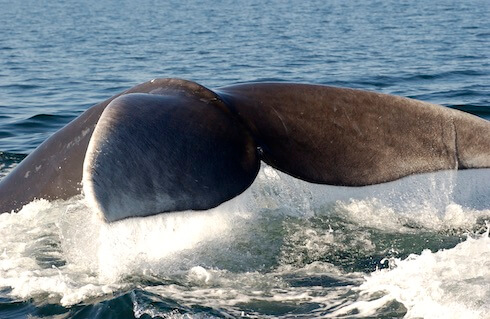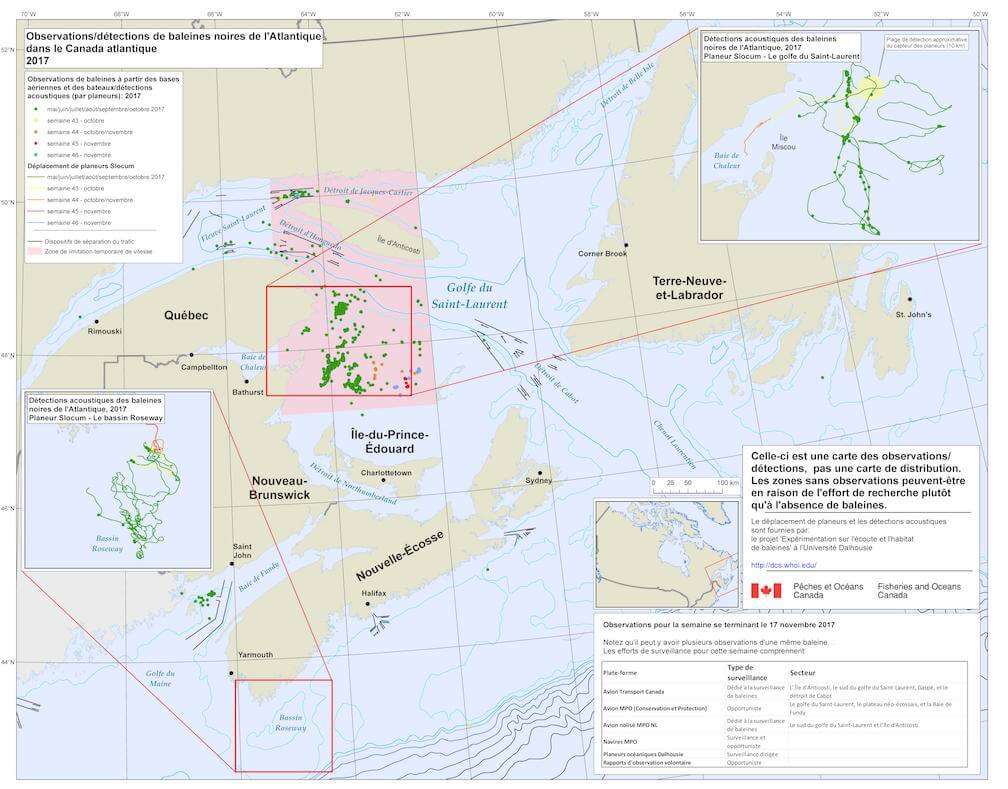At least 15 right whale sightings were made in the Gulf of St. Lawrence during the week of November 17, according to air census data. For the time being, the reduced speed limit of 10 knots is therefore being maintained. Put into place last August, this measure aims to reduce the risk of fatal collisions between right whales and ships following an unprecedented surge in mortalities for this species in the Gulf of St. Lawrence.
The search for new protective measures continues, this time well before the start of next summer. A day of discussions was organized by Fisheries and Oceans Canada on November 9 in Moncton, New Brunswick. Gathered around the table were fisheries organizations, members of the shipping, cruise and ferry industries, Aboriginal communities, right whale experts and scientists, as well as representatives of the US National Oceanic and Atmospheric Administration ( NOAA).
Following these discussions, solutions that the Canadian government is considering include modifications to fishing gear to reduce the risk of entanglements, better management of material to reduce fishing gear losses, harmonizing fishing season dates with those periods when right whales are most present, increased whale observation and detection efforts to better communicate information to vessels and fishermen, and reduced speed limits in certain zones, all while closely cooperating with the various stakeholders.
Fishermen’s associations continue to affirm their support for the protection measures. The snow crab fishery has a “sustainable” certification, but the international environmental certification agency SAI Global reported in October that it will reassess the status of this fishery in light of the mortality event. This certification is sought by consumers, and the removal of this label could cause significant losses for fishermen and the industry.
To read the complete story: 2017 Right Whales Mortalities
Recap
- June 6: drifting in the Gulf of St. Lawrence, a first right whale carcass is reported to the Quebec Marine Mammal Emergency Response Network.
- June 18: second carcass reported.
- June 19: third carcass reported; active research begins to locate and track drifting carcasses.
- June 21: fourth carcass discovered.
- June 22: fifth carcass discovered.
- June 23: sixth carcass discovered.
- June 29 to July 1: initial series of three necropsies carried out in Norway, Prince Edward Island. Preliminary results reveal blunt trauma and chronic entanglement marks.
- July 5: a disentanglement operation results in the release of a right whale caught in fishing gear.
- July 9 and 10: second series of two necropsies carried out in Corfu (Magdalen Islands).
- July 10: The successful release of an entangled right whale was overshadowed by the tragic death of fisherman and whale rescuer Joe Howlett, a member of the Campobello Whale Rescue Team.
- July 11: Following the loss of Joe Howlett, the Canadian government imposes a temporary moratorium on disentanglement operations. The US National Oceanic and Atmospheric Administration also imposes a moratorium.
- July 19: after a lull of several days, a seventh carcass is found.
- July 20: Fisheries and Oceans Canada prematurely closes the snow crab fishery to reduce the risk of entanglement.
- July 21: Discovery of an eighth carcass and sixth necropsy.
- July 27: two carcasses found: a ninth individual is confirmed, while the second carcass may already have been counted.
- July 30: a carcass washes ashore in Newfoundland; it may have already been counted.
- August 11: Canadian Coast Guard issues a Notice to Shipping requiring speed reduction for vessels over 20 metres long.
- August 14: a carcass is found on the US east coast, the third one for this sector of the Atlantic.
- August 25: US launches its own investigation into the unprecedented mortality event of North Atlantic right whales.
- August 28: an entangled right whale is reported off the Gaspé Peninsula and is not to be seen again.
- September 15: new carcass discovered, bringing the number of right whale carcasses found in Canadian waters to 11.
- September 19: seventh necropsy, performed on Miscou Island in New Brunswick.
- October 5: the Incident Report: North Atlantic Right Whale Mortality Event in the Gulf of St. Lawrence is released.
Some Reference Elements
The Necropsy Report
Daoust, P.-Y., E.L. Couture, T. Wimmer and L. Bourque. 2017. Incident Report: North Atlantic Right Whale Mortality Event in the Gulf of St. Lawrence, 2017. Collaborative Report. Produced by: Canadian Wildlife Health Cooperative, Marine Animal Response Society, and Fisheries and Oceans Canada. 224 pp. Online.
The Government Summaries
Canada: Right whale deaths in Gulf of St. Lawrence
United States: 2017 North Atlantic Right Whale Unusual Mortality Event
On Whales Online
Whales of the St. Lawrence: North Atlantic Right Whale
Our report on entanglements: “Whales in the Nets”
On the speed limits : Reduced speed limits for ships: an effective measure for protecting whales?
On the decline of the right whale population: North Atlantic Right Whales Declining Since 2010, Confirms Study
Portrait of nine of the whales that died this summer: Giant Losses.
Elsewhere in the Media
Deep Trouble: the North Atlantic right whale in peril, a podcast series (CBC, from July to September, 2017)
‘Deflated’ carcass declared 17th North Atlantic right whale to die this year (CBC, December 8, 2017)
Already on Brink, Right Whales Are Pushed Closer to the Edge (Yale Environment 360, December 7,2017)
La mort de baleines noires est le sujet de l’année dans le monde animal (Radio-Canada, December 6, 2017)
North Atlantic’s greatest survivors are hunted once more (The Guardian, November 25, 2017)
Protection des baleines: plus de 250 avertissements aux navires (Le Devoir, November 25, 2017)
Solutions for right whales (in French, Radio Gaspésie, November 16, 2017)
The North Atlantic right whale faces extinction (Science, November 8, 2017)
Changes can be made right now to save right whales, says fisherman (CBC, November 8, 2017)
Right whales (in French, Découverte, November 5, 2017)
Right whale mortality: snow crab fishery could lose “sustainable” certification (in French, Radio-Canada, October 18, 2017)






